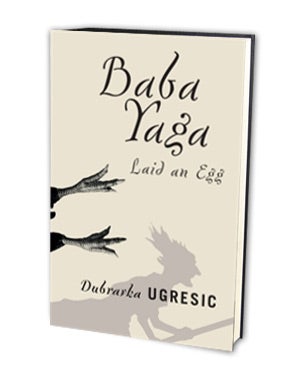Baba Yaga Laid an Egg, By Dubravka Ugresic
In praise of the mythical older woman

Your support helps us to tell the story
From reproductive rights to climate change to Big Tech, The Independent is on the ground when the story is developing. Whether it's investigating the financials of Elon Musk's pro-Trump PAC or producing our latest documentary, 'The A Word', which shines a light on the American women fighting for reproductive rights, we know how important it is to parse out the facts from the messaging.
At such a critical moment in US history, we need reporters on the ground. Your donation allows us to keep sending journalists to speak to both sides of the story.
The Independent is trusted by Americans across the entire political spectrum. And unlike many other quality news outlets, we choose not to lock Americans out of our reporting and analysis with paywalls. We believe quality journalism should be available to everyone, paid for by those who can afford it.
Your support makes all the difference.Are these tough old birds human? Note their scrawny legs; hear the baleful racket that comes from their beaky mouths. Who needs them? Once in the forest (so our beaky grannies taught us) there dwelt a crazy crone called Baba Yaga: she'd devour you as soon as look at you. Her hut was built of bones; believe it or not, the hut had hen's legs and turned round on the spot. In the eastern territories of Europe we all know about her: more than we want to know. Witch, midwife, demon, healer, destroyer, death's-head, she may be your elderly neighbour.
Like the birds, Baba Yaga is legion. There is no escaping her and – if I live – I myself am destined to become a version of her. All the characters in Baba Yaga Laid an Egg are versions of this heterogeneous, devious crone. Dubravka Ugrešic's contribution to the Canongate Myths series takes the form of a triptych. In the first section, an author describes her mother's decline; their ambivalent relationship is complicated by the insinuating appearance of Aba, a folklorist. In part two, three ancient women, Pupa, Beba and Kukla, visit a Czech health resort. The equivocal Aba surfaces in the last section as the anagrammatic exegete, Aba Bagay. If you feel confused by the proliferating stories, Dr Bagay comes with a key.
Baya Yaga Laid an Egg ( translated by Ellen Elias-Bursac, Celia Hawkesworth and Mark Thompson) is a mirthlessly witty divertimento on female old age. Ugrešic's meta-narrative sings with intelligence; its cryptic weirdness challenges the reader. Set in the splintered aftermath of the break-up of Yugoslavia, its persons inhabit a borderline between tragedy and farce.
Old women are treated as grotesques – but by whom? Viewpoint is everything. From the perspective of the boy-receptionist, the wheelchaired hotel guest constitutes "a piece of humanoid crackling". The plot's phantasmagoria represents the ugly eye of the beholder; the tendency of society to demonise old women. Baba Yaga, a patriarchal creation, turns out to have a feminist sword under her pillow.
Pupa, the Methusalem of this trinity of old lasses, who fulfils her last wish (to die and be delivered from the hell of history), was once a gynaecologist. A persecuted Jew and Partisan during the war, imprisoned under the Cominform, she ended in exile, separated from her child. This is the narrative of affliction hunkering behind the carnivalesque narrative. As Dr Bagay explains, myths are memes, "units of cultural transmission" which "take themselves to pieces... adapt and readapt".
These stories are a whirligig of outrageous invention. I shall remember most poignantly the old, old story of a difficult mother-daughter relationship. As the mother's world shrinks, a valedictory tenderness is squeezed from the substance of the myth. The daughter, dissolving into sobs, spits out "a fragile tiny body in the palm of my hand, all wet from tears and saliva... as if it were my own small baby".
Stevie Davies's latest novel is 'The Eyrie' (Phoenix)
Join our commenting forum
Join thought-provoking conversations, follow other Independent readers and see their replies
Comments